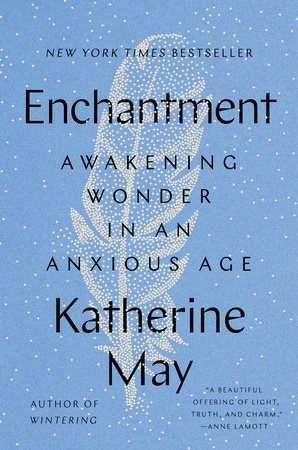Katherine May is a writer who, like me, lives by the sea. In my case it is the Jersey Shore (I know, it’s technically the Atlantic Ocean, not a sea) while in her case it is Whitstable, England. Her previous book was “Wintering”, a best seller in 2020. Now, in 2023, comes “Enchantment“. With her British accent, Katherine herself in enchanting to listen to, as you can have the pleasure of doing by watching this podcast.
Why am I making a big fuss about Katherine in a blog about vision, you might ask? It is because one of her many short chapters, just eight pages titled Burning Books, may be one of the most intimate portrayals of reading and the psyche that you’ll encounter. It delves in to the reading experience beyond eyesight and is so beautifully conceived that I felt compelled to share it with you. As you read it, think in particular of parents who say that they wish their child would read for pleasure. Or of brain injury patients who have lost their zest for reading. Or of high school or college students who can no longer get by with the reading skills they have, as the demands ramp up.
Here, for your reading pleasure, is the excerpt from Enchantment (pages 122-129):

“I am still unable to read. Reading is the whole of me, the foundation upon which I rest, and these days I cannot do it. It is a dirty secret that I must keep, an ugly act of faithlessness in an author. I do not want to read. I cannot read. I cannot shepherd my attention towards a page of text and take in any words. I cannot complete a whole chapter without my consciousness excusing itself and quietly retreating into an inner sanctum to which I have no access. I cannot sit still. I cannot concentrate. Surely this is some kind of a malady for which there out to be a cure?
This disconcerting outage hits fiction worst of all. I can browse through scraps of nonfiction, an article here and there. But novels: no. I have nothing for them. I am entirely disinterested in stories that didn’t happen, in the interior lives of people who don’t exist. I am overtaken by apathy. I know that this is a fault in me rather than in any book. But it is tangible, this cynicism, this turning away. I cannot get past it.
My lack of reading is a furtive thing, a fugitive state of being that I must not show to the people who know me. I feel disordered by it, the familiar world sliding out from grasp. It is not as though I’m doing something else instead. I have not transferred my allegiance to Netflix. I am just not reading. There is a gaping void where I used to rest my mind.”
[And then, in dealing with University life, and visiting the library …]

“I had been to libraries before, but not like these. Everything was laid out, waiting for me. I wanted to assimilate all of it. I wanted, one day, to own a set of shelves like these. But somehow I could not take it in. The reading skills I had – the blunt instruments of letters and words – were not equal to this task. It turns out that I had done only the palest part of reading before, racing through literary paperbacks and assimilating textbooks to populate exam papers at the end of each year.
Here was a different kind of reading: disciplined, complex, unfathomable. Books that had to be assigned, search for in long drawers of index cards, located on a shelf, then somehow, read and understood. This was the impossible part, because each book was nearly impenetrable, texts so dense with learning they felt like intellectual black holes, informational molasses. Every single paragraph, every single sentence, depended on a backlog of knowledge to support my understanding. I could barely break in.
I would seat myself in one library or another, open the correct page, and then feel the words repel my eager eyes. I was rain, and they were waterproof. Who was I to come to them, a this girl who didn’t even know that this kind of knowing existed, who had never considered that she might be unequal to the task of taking it all in. Feeling stupid, I did a stupid thing. I stopped going to lectures. I stopped picking up reading lists. I found that it was easy enough to evade assignments and supervisions if only I kept a low profile … I couldn’t bear to turn in anything that so clearly revealed my imperfection.”

[Confronting her paralyzing fear of imperfection, followed by avoidance and then self-sabotage, Katherine makes a comeback …]
“Once I had realised my talent for fire, I could allow myself to start all over again. My index finger returned to sweep over the lines in an effort to hold my eye steady … How have I allowed this great pleasure in my life – the act of sitting quietly with a book and drinking in its words – to become so heavy, so freighted with obligation? Somewhere along the line, I lost the sense of playfulness that drew me towards it in the first place. No wonder my reading went on strike.
I always thought that my future self would have ranks of books like my professor, all of them read and understood, an achievement in the past tense that proved I had become something. I now see that this was not what she showed me. She offered me instead the act of knowing, rather than the static fact of the known, a lifetime of enquiry.”

I also decided to share these passages with you because occasionally one is privileged enough to have a professor who peers deeply into the soul of a struggling student. Sometimes, based on her own life’s experiences, that professor might make a connection between a student’s willingness to learn, and their futility. While I did not personally have this experience as a student, I have met a professor – now retired – who had that kind of empathy for her students that Katherine May describes. She is widely respected and admired, and you may have encountered her lecturing or writing. Her name is Susan R. Barry, Ph.D.